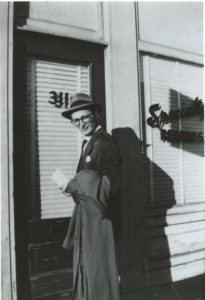Born Arthur N. Goldberg on September 5, 1917, to a Jewish working-class family in Greensburg, Pennsylvania, Art Rupe grew up in nearby McKeesport in the Pittsburgh metro area. He attended college at Virginia Tech and Miami University of Ohio, and in 1939, set off for Los Angeles to make his way in the world. Years later, he would complete his university education at UCLA.
It was upon arrival in California that he changed his surname to Rupe; he had learned from his paternal grandfather that this was in fact the family name, Goldberg having been adopted at Ellis Island. Thus, he reclaimed his family name, a fresh start in a new land of opportunity.
During the Second World War, Rupe worked on an engineering crew, testing Liberty ships on L.A.’s Terminal Island. As the war was winding down, realizing he would soon be unemployed, he resolved to go into business as a record producer.
Growing up in an ethnically and racially diverse neighborhood in McKeesport, Rupe had developed a keen interest in Rhythm ’n’ Blues and Gospel music. He therefore chose to specialize in what was then called “race records,” music made by and for African Americans.
In late 1944, with Ben Siegal, Rupe formed Juke Box Records. His first record “Boogie #1,” produced on a low budget with only three musicians, sold 70,000 copies, a regional hit at the time.
In September 1946, Rupe set out on his own, launching a new label, Specialty Records. Over the next fifteen years, Specialty became one of the most prominent independent recording companies, with worldwide distribution. Rupe’s work at Specialty played a key role in the emergence of the new musical genre of Rock ’n’ Roll. The label featured such artists as Roy Milton, Percy Mayfield, Joe and Jimmy Liggins, Lloyd Price, Little Richard, and Sam Cooke. In addition to his election to the Rock & Roll Hall of Fame, Art Rupe was inducted into the Blues Hall of Fame.
In 1952, Art Rupe had also begun to invest in oil and gas production. Several years later, he started his own company, Artex Oil Company, with offices in Wichita Falls and later in Abilene, Texas. In 1992, Rupe moved his oil and gas interests to Marietta, Ohio, and entered into a partnership with Jerry James and Gene Huck.
Rupe’s success in the energy business enabled him to found and endow the Arthur N. Rupe Foundation, a 501(c)(3) grant-making philanthropy. Seeking “creative solutions to societal issues,” the Foundation’s primary area of activity is public policy research, education, and advocacy. It has also sponsored debates on controversial issues in both academic and civic settings. And a significant portion of its resources support caregivers for people with Alzheimer’s disease and dementia.
Arthur N. Rupe passed away on April 15, 2022. He is remembered by his colleagues for his keen critical intelligence, his boundless curiosity, his indefatigable devotion to his work, his sincere gratitude for the blessings of American liberty, and his zeal to make the world a better place.

